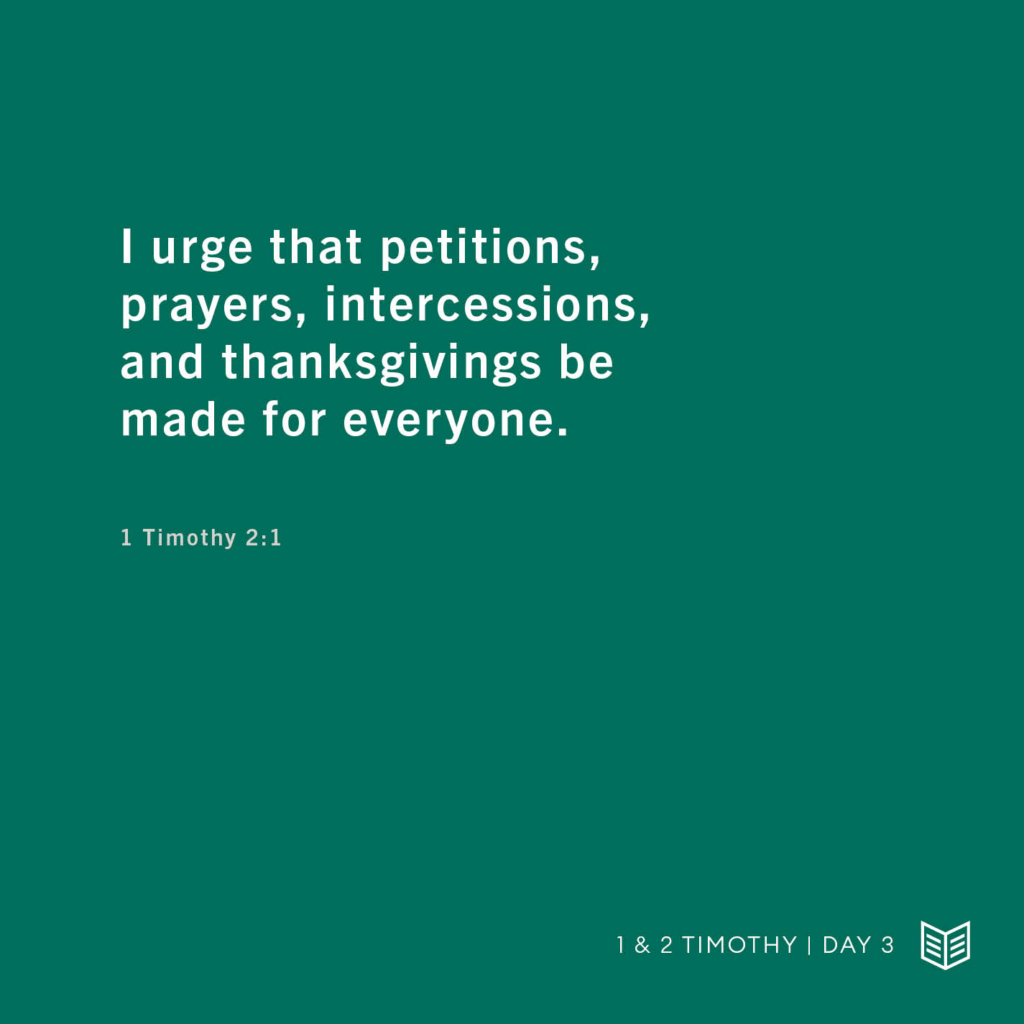Just as we’ve all been doing for the past few millennia, I skipped ahead this morning. I glanced at 1 Timothy 2 and read the last few verses and my stomach sunk. This chapter has been hotly debated by theologians far more versed than I in the original languages, in historical context, and in all kinds of study. How can I possibly add to the conversation?
To write about 1 Timothy 2 for a community of women who will all have some sort of pain or story or lens through which they read this chapter feels too daunting for me. But then my eyes catch the last words of it: “continue in faith, love, and holiness, with good sense” (1Timothy 2:15). What does it mean, first, for me to honor and obey these words before I think of communicating them to others? Chiefly it means to exercise self-control and read from the beginning. My eyes moved back up the page to these words:
“First of all, then, I urge that petitions, prayers, intercessions, and thanksgivings be made for everyone, for kings and all those who are in authority, so that we may lead a tranquil and quiet life in all godliness and dignity. This is good, and it pleases God our Savior, who wants everyone to be saved and to come to the knowledge of the truth” (vv.1–4).
“First of all, then…”
There is an order to these words. Paul wants to communicate something to Timothy: that all people in all places need “petitions, prayers, intercessions, and thanksgivings” made on their behalf, and in doing so it leads to a “tranquil and quiet life in all godliness and dignity” (vv.1–2). It gives dignity to all people everywhere when we pray for them, thank God for them, and intercede on their behalf.
It seems to me the enemy’s best ploy is to steal our dignity, our quietness, and our peace by disordering our reading. Enticing us to lack self-control and skip passages, cherry-picking the most difficult or most beautiful to meet whatever need we have in ourselves or see in culture. But to live quietly, peacefully, and with dignity, we must read in order and, in some ways, do in order.
Before we argue about hotly debated subjects, do we first dignify one another by praying, interceding, and giving thanks for each other? Are we first people of peace by offering supplication (the action of asking or begging for something earnestly or humbly) on behalf of their personhood, character, story, theology, and personality? Are we primarily people of quietness, trusting that it is God who changes hearts and minds and stories—not us?
There is so much division in our world today. One needs only a cursory glance at the news to know brokenness abounds. But it’s not just in culture; it’s in the Church, too—this passage is a prime example of passages that divide instead of unite. How, then, can we be people who first pray before debate, who first intercede before we interject, and who first give thanks before we theologize?
This morning, as I write, I want to stay in the first few verses of 1 Timothy 2 before I move further down in the passage. I want to learn to pray with this kind of open-handedness to the God of the universe on behalf of all people everywhere.



100%!
@Courtney
I understand what you’re saying, I do, but we have to also understand that realistically, God placed our husbands and fathers in a headship role over us. There are more than a few verses that speak on that. That doesn’t mean we are inferior or subordinate. It means that their God given role is to lead us to Christ. The best way to show it is by taking a pair of your husbands shoes and trying to walk around in them. More than likely, his shoes will be significantly bigger, therefore a little clunky. Hard to walk in, possibly causing you to stumble. The same process is applied to our lives when we are serving God. God gave men a certain role and He gave women a certain role. One is not greater than the other, it’s just different. We, as women, will stumble when we try to take on a Godly man’s role, and the men will do the same when they try to take on a Godly woman’s role. We each have our own paths to walk.
Hey! I think theologians still have many theory’s and don’t completely agree as to what Paul means here, but someone once explained to me that it comes back to the ‘seed’ of Eve, in that through child bearing Jesus (a descendant of Adam), is the saviour of the world. Not sure if this helps or if it’s more confusing, happy to also be wrong, but thought I’d share it anyways!
I also have several medical conditions that affect my ability to have children. I hold hope in that this passage does NOT mean salvation comes from giving birth, that would be contradictory to the rest of Gods word (including this passage in verses 5-6) which says Jesus alone is the only way to Father, he alone is our salvation, giving birth is NOT.
Praying for you this morning sister Xx
Hey! I think theologians still have many theory’s and don’t completely agree as to what Paul means here, but someone once explained to me that it comes back to the ‘seed’ of Eve, in that through child bearing Jesus (a descendant of Adam), is the saviour of the world. Not sure if this helps or if it’s more confusing, happy to also be wrong, but thought I’d share it anyways!
I also have several medical conditions that affect my ability to have children. I hold hope in that this passage does NOT mean salvation comes from giving birth, that would be contradictory to the rest of Gods word (including this passage in verses 5-6) which says Jesus alone is the only way to Father, he alone is our salvation, giving birth is NOT.
Hey! I think theologians still have many theory’s and don’t completely agree as to what Paul means here, but someone once explained to me that it comes back to the ‘seed’ of Eve, in that through child bearing Jesus (a descendant of Adam), is the saviour of the world. Not sure if this helps or if it’s more confusing, happy to also be wrong, but thought I’d share it anyways!
@JessicaTimperio hello! I had the same questions and did a lot of studying and this is what stood out – at time time of Paul’s letter to Timothy, there was a rumor that when women had sex they lost their salvation. In order to bear children they needed to have sex… thus the rumor took hold. Paul is simply telling Timothy to proclaim that salvation remains after women have sex, it is irreversible and true.
I did some digging and found this online. Maybe this will help!
The way I construe the logic of 1 Timothy 2:12–15Open in Logos Bible Software (if available) is as follows. In verse 12, Paul sets boundaries for women in the church. In verses 13–14, Paul gives two reasons for this: (1) creation order: the man was created first, then the woman (v. 13); (2) the scenario at the Fall: rather than God-man-woman-Satan, a complete reversal had taken place: Satan-woman-man-God. In v. 15, Paul addresses the question, “How can women today avoid the mistake made by Eve?” The answer: by adhering to their God-given boundaries and tending to their God-given responsibilities.